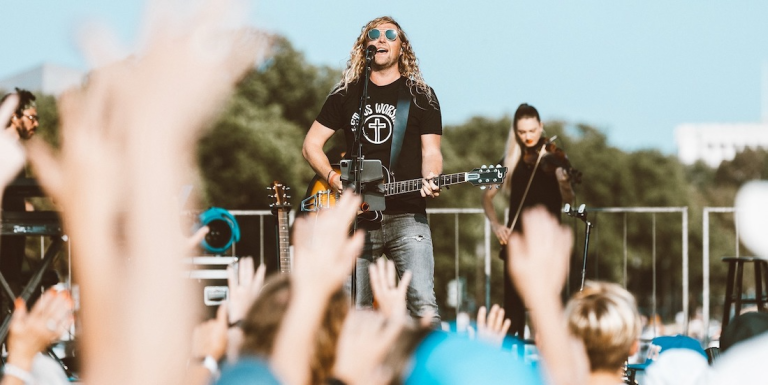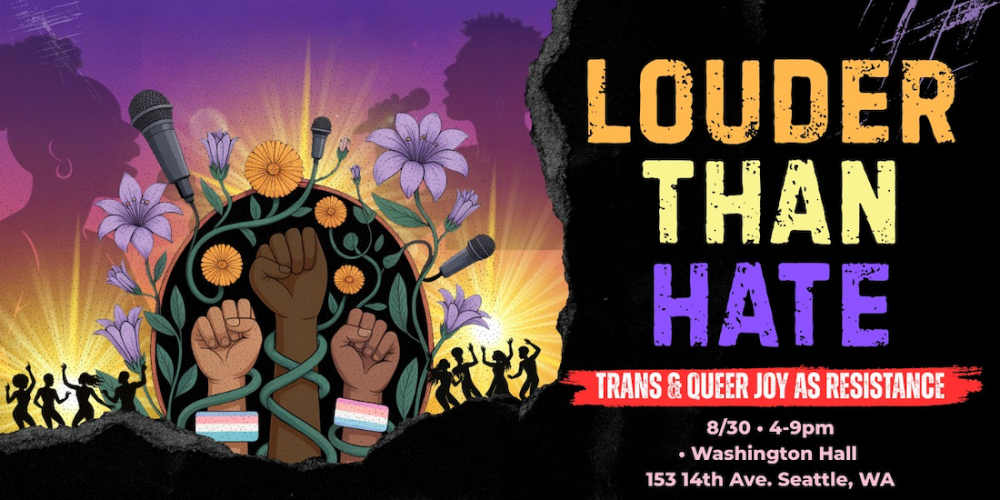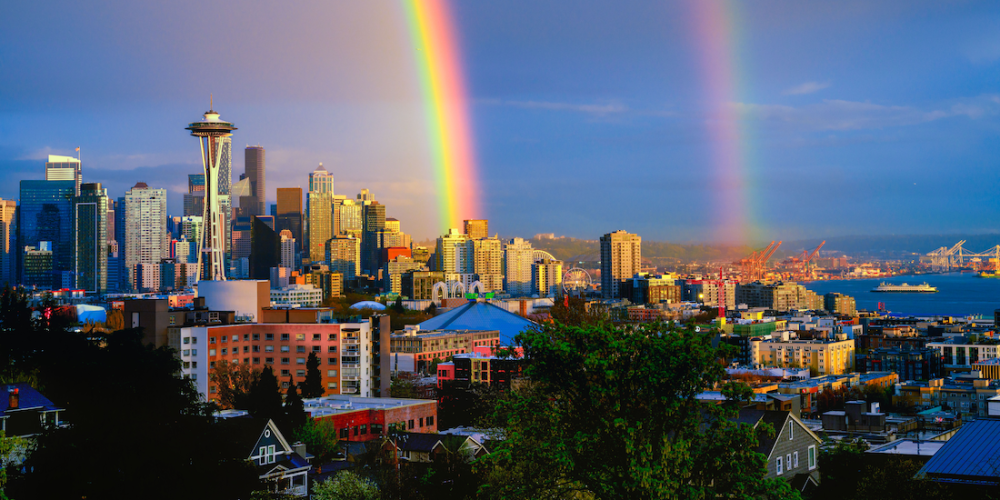
Progressive Activists Label Worship Event as Harassment, Urging Permit Revocation While Mayor Upholds Free Speech Rights
New York, N.Y. – Amid escalating tensions in one of the U.S.’s most progressive urban centers, a so-called Christian worship concert led by conservative activist Sean Feucht is proceeding as scheduled at Seattle’s Gas Works Park on August 30, 2025.
Despite vehement opposition from LGBTQ+ organizations, who have branded the event as “malicious harassment and incitement,” city officials have affirmed the organizer’s constitutional protections under the First Amendment.

This clash highlights ongoing debates over religious expression, public spaces, and community inclusivity in deeply divided American cities.
Sean Feucht, a California-based singer, songwriter, and preacher, gained national attention during the COVID-19 pandemic through his Let Us Worship movement.
Launched in 2020, the initiative protested government-imposed restrictions on religious gatherings, framing them as infringements on faith-based freedoms.
Feucht’s events often blend contemporary Christian music with conservative political messaging, including support for President Donald Trump [Luce Index™ score: 35/100] and critiques of progressive social policies.
His “Revive in ’25” tour, which kicked off earlier this year, aims to spark spiritual renewal across North America, but it has repeatedly encountered resistance in liberal strongholds.

In Seattle, a city renowned for its vibrant LGBTQ community and progressive politics, Feucht’s planned rally has stirred significant controversy. Initially set for Cal Anderson Park in the Capitol Hill neighborhood—a historic hub for LGBTQ rights and the site of the 2020 CHOP autonomous zone—the event was relocated to Gas Works Park following concerns raised by local leaders.
Seattle Mayor Bruce Harrell and Councilmember Joy Hollingsworth urged the shift, citing public safety considerations rather than content-based restrictions. “The law is crystal clear. You cannot shut down a venue on anticipated speech,” Harrell stated in an interview with KING 5 News. He emphasized that any group, regardless of viewpoint, has the right to assemble in public parks under constitutional protections.
Backlash from Community Advocates
Opposition to the event has been spearheaded by groups such as Capitol Hill Pride and the Lavender Rights Project, a Black transgender feminist organization.
Charlette LeFevre, director of Capitol Hill Pride, described the rally as antithetical to Seattle’s values, telling local media, “This is not what Seattle is about.” Critics point to Feucht’s past statements on social issues, including his opposition to LGBTQ-inclusive policies, as evidence that the gathering could foster an environment of exclusion or harm.
The Lavender Rights Project, along with 15 partner organizations, announced plans for a counter-event to challenge what they termed a “propaganda machine.” This response echoes broader concerns about Christian nationalist movements, as outlined in analyses from outlets like Cascade PBS, which situate Seattle within a larger playbook of conservative activism targeting progressive cities.
Activists argue that allowing such events in symbolically significant locations like Capitol Hill could undermine efforts to create safe spaces for marginalized communities.
Recent history amplifies these fears. Just months earlier, in May 2025, violence erupted at Cal Anderson Park during the MayDayUSA “Don’t Mess With Our Kids” rally, a Christian-led protest against certain educational policies perceived as promoting LGBTQ ideologies. Counter-protesters clashed with attendees, resulting in 23 arrests by the Seattle Police Department.
Police reports indicated that items were thrown between groups, and one officer required medical treatment after being assaulted. Mayor Harrell attributed the unrest to both the rally participants and “infiltrating anarchists,” underscoring the volatile potential of such gatherings.
Echoes of Canadian Controversies
Feucht’s challenges in Seattle follow a string of permit revocations in Canada, where eight cities canceled his tour stops earlier in August 2025.

In Edmonton, Alberta, on August 22, 2025, Feucht performed on the legislature grounds amid protests from LGBTQ supporters, who displayed messages decrying the event.
Canadian officials cited public safety and permit issues, but Feucht framed the decisions falsely as “discriminatory against Christians.”
In West Kelowna, British Columbia, the concert was axed over “public safety” concerns, with Feucht accusing mayors of hypocrisy for allowing pride events while restricting worship services.
These international setbacks have fueled Feucht’s narrative of persecution. In a video posted on X, he rallied supporters for the Seattle event, stating, “Will you help us bring the fire of God’s presence to Seattle?” and soliciting donations.
He referenced past Antifa disruptions in Seattle, humorously noting how opponents’ live streams inadvertently spread his message.
Feucht’s resilience is evident in his statement to Fox News Digital:
“Every single time we come to worship in Seattle, we face many different kinds of resistance. However, as you’ve seen through the five-year history of Let Us Worship, we refuse to back down for anything.”

Police Preparedness and Free Speech Debates
In anticipation of potential unrest, the Seattle Police Department has bolstered its presence at Gas Works Park, a 19-acre (7.7-hectare) site overlooking Lake Union. The department’s strategy draws from lessons learned in May, aiming to prevent escalations while respecting assembly rights. A spokesperson for Mayor Harrell reiterated the city’s commitment to the LGBTQ community, noting, “At the same time, the City strongly celebrates and supports the LGBTQ+ community.”
This situation underscores broader U.S. tensions surrounding free speech. Legal experts argue that content-based permit denials violate the First Amendment, as affirmed by Harrell. Yet, advocates for vulnerable groups contend that speech perceived as inciteful can lead to real-world harm, prompting calls for nuanced public policy.
In Seattle, where 26% of residents identify as non-religious according to
recent surveys, the intersection of faith and politics often sparks debate.
Feucht’s movement has also drawn support from conservative figures. Pastor Paula White-Cain, a former Trump White House faith advisor, condemned violence at previous events on Fox News’ “Hannity,” alongside journalist Katie Daviscourt. Additionally, reports indicate the FBI is investigating claims of targeted violence against religious groups following evangelical protests in Seattle.
Looking Ahead: Revival or Division?
As the concert unfolds, observers anticipate a mix of worship, protest, and police oversight. Feucht’s tour continues post-Seattle, with stops in Missoula, Montana, and Yakima, Washington, before heading to the nation’s capital. His efforts have inspired similar revivals, such as a blue-city pastor reporting tens of thousands attending a Christian crusade earlier this year.
Critics, however, view these events as part of a larger Christian supremacist strategy, as detailed in The Stranger’s coverage. Edmonton City Councilor Andrew Knack publicly opposed a similar Feucht event, calling it counter to values of inclusion. In contrast, supporters like those on X pray for Feucht’s safety and success, seeing the backlash as affirmation of their cause.
Ultimately, the Seattle rally encapsulates America’s cultural fault lines. While Feucht frames it as a stand for faith and freedom, opponents see it as a threat to hard-won progress.
As one protester’s sidewalk message in Edmonton poignantly stated amid the August 22, 2025, gathering: the divide persists. With the event drawing national attention, its outcome may influence future policies on public assemblies in progressive enclaves.
Summary
In Seattle, Christian worship leader Sean Feucht defies backlash from LGBTQ groups to hold his “Revive in ’25” concert at Gas Works Park on August 30, 2025. Activists label it harassment and plan counter-events, but Mayor Bruce Harrell upholds First Amendment rights amid safety concerns. This follows Canadian permit denials and echoes past violence at similar rallies, highlighting tensions over free speech and inclusion in progressive cities.